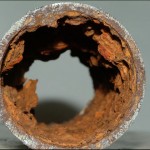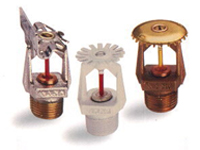Have you heard of MIC?
MIC is a microorganism that could be affecting your commercial fire protection, more specifically, the pipes in your sprinkler system. MIC stands for Microbiologically Influenced Corrosion, and is becoming increasingly prevalent nationwide.
There are three main causes for the rising cases of MIC in commercial fire sprinkler systems: changes in pipe materials, the way we disinfect the water, and increased maintenance activity in sprinkler systems. The MIC microorganisms do not directly cause the damage, however their biological processes produce different chemicals that accelerate corrosion, or rusting in pipes. MIC is more common in warm weather areas, but incidences have now been reported nationwide, even in in Illinois. It is estimated that North American companies spend about $1.5 billion per year on chemical treatments to combat MIC.
Early detection and preventative treatment for MIC is key to preserving your sprinkler system. So what can you do?
1. Piping should be flushed in new systems to remove oil and debris, which is potential food for microorganisms. Newer systems are designed to be flushed easily.
2. Test and drain systems as infrequently as possible, because fresh water can bring in more food for the microorganisms.
3. If your pipes are especially MIC prone, you may consider thicker wall piping.
4. Use water tests, but don’t rely on them solely to detect MIC leaks. Watch for leaks at the joints of the pipes, but keep in mind that water tests are not conclusive because microorganisms are always present in small amounts. Water tests are, however, the first step to identifying MIC as a problem in your system.
At Total Fire & Safety, we are experts in early detection as well as potential treatment options and solutions for MIC in your sprinkler system. If you would like a check for MIC, or if a water test has confirmed MIC in your sprinkler system, contact us to find the most cost effective way to treat the problem. We will provide the total solution!
 Facebook
Facebook
 Instagram
Instagram
 LinkedIn
LinkedIn


